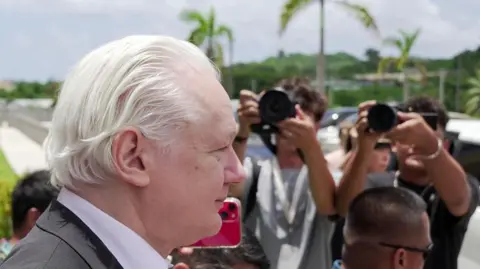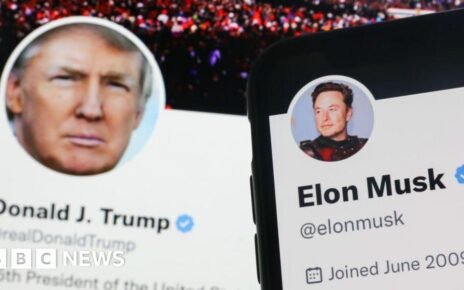[ad_1]
By Jonathan Head, BBC News, Saipan, Northern Mariana Islands
 Reuters
ReutersThe sleek, marble district courthouse in Saipan could be anywhere in the United States, but for the officials who welcomed us in their bright, flowery shirts. Warm ocean breezes coming off the Pacific rustled the leaves of the flame trees whose flowers blaze against soft green grass.
It was the most unlikely venue to witness the end of the long and bitter saga of Julian Assange.
It had been chosen by Assange as the US territory farthest from the US mainland, from the power centres in Washington against which he had waged so many of his campaigns.
Lying 2,500km (1,550 miles) east of the Philippines, Saipan is on the way to nowhere.
Except, perhaps, Australia.
 EPA
EPAInside the courtroom though it was all business.
Even Assange, whose appearance has taken some wild turns over the past 14 years, had smartened up, tightening his rumpled brown tie and sporting a black jacket.
Judge Ramona Manglona, who was hearing what must have been the biggest case of her career, would not be rushed.
She picked over each detail of the deal the Wikileaks founder had struck with US government prosecutors to end their long legal battle, repeatedly checking that he was happy with what he had agreed.
At times looking a little nervous he responded firmly to every question that yes, he was happy.
There was little of the bravado he had shown in his former years. Both Julian Assange and the prosecutors appeared worn down by their long feud, and anxious to get to the end of the hearing.
There was just one flash of the old Assange when he was asked by the judge if he now accepted that he had broken the law.
He replied that when he was running Wikileaks, and dropping thousands of classified documents into the public realm, he believed this action was protected by the first amendment of the US constitution guaranteeing freedom of expression, and that he believed the Espionage Act, under which he was being charged, was in conflict with that amendment.
But it did not last long. Yes, he acknowledged, whatever I thought then I do now accept that I have broken that law.
Outside the courthouse people were baffled by the sudden invasion of journalists, something unfamiliar in a place which sees little news.
I was last here when I accompanied Japanese Emperor Akihito and Empress Michiko, 19 years before Julian Assange brought his fame to Saipan.
The territory, capital of the Northern Mariana Islands, was the scene of a particularly nasty battle in World War II when it was under Japanese rule, and troops and civilians were told they could not surrender to the advancing Americans.
Hundreds of civilians were persuaded to jump to their deaths from a high cliff in the north of the island.
The emperor and empress stood on the edge of the cliff, contemplating the terrible loss of life set in motion by their forebears.
Today, people were approaching us with bags of mementos, capitalising on their far-flung island’s moment in the spotlight. Some had no idea who Julian Assange is. There was no opportunity to find out.
After two hours of deliberation Judge Manglona announced his release: “An early happy birthday to you,” she said. Assange turns 53 next week.
And she reminded him and the prosecutors that Saipan had just celebrated 80 years of peace, since those terrible battles between the Japanese and the Americans and said she hoped he could now find peace in his own life.
Within minutes, Julian Assange was in a car to the airport, and on his way back to Australia. And Saipan slipped back into its languid routine of flowers and palms and Korean honeymooners strolling the beaches.
[ad_2]
Source link




